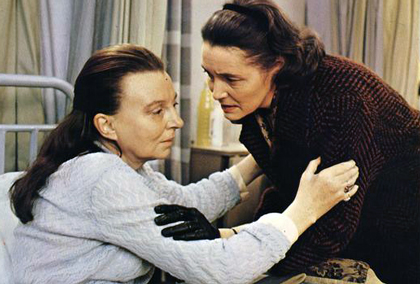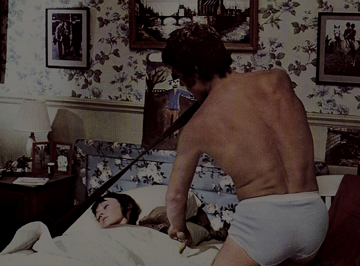
 |
|
|
|
Horror fans looking for something beyond gory thrills will find 1971's The Night Digger a true surprise. In a year that saw the horror genre reaching deeper into the limits of formerly forbidden subject material, this show gives us a strong drama with excellent acting and a convincing storyline. Technically it's a Grand Dame Guignol tale, with actress Pamela Brown as a blind, domineering mother and Patricia Neal as her long-suffering adopted daughter. A rogue male brings with him dark secrets and horrible midnight "activities" that stay hidden long enough for the daughter to fall in love with him. What's more, the entire enterprise is accompanied by a Bernard Herrmann soundtrack score that eases the third act into a hopeless, but almost poignant love story. Former stroke victim Maura Prince (Patricia Neal, herself a stroke victim) has a talent for guiding patients through speech therapy, but she cannot take a job in the field. Her blind mother Mrs. Edith Prince (Pamela Brown) insists that Maura serve and wait on her in the large and mostly empty family mansion, Twin Towers. When Maura had her stroke years ago, Edith took good care of her, and now both a personal commitment and social pressure have conspired to keep Maura working like a servant. 20 year-old Billy Jarvis (Nicholas Clay) appears and asks for a job working on the house. Maura doesn't like the boy's looks but Edith disregards the fact that Billy has no references. Talking herself into the notion that Billy is a blood relation, Edith lets the boy stay in the house. Billy is an excellent handyman and gardener and both women warm to him. But then he is attracted to a young woman he sees at church, and his odd attitude suddenly chills into a sinister resolve. When the sun goes down Billy sets out on his motorcycle on a mission of murder. 
Nothing about The Night Digger is particularly original -- lonely women are menaced in an old house and a woman falls in love with a serial killer -- but the familiar building blocks are assembled in an unusual way. With the sensitive actress Patricia Neal playing the main role, the show might be called The Subject was Blood-Red Roses. Director Alastair Reed (Traffik) paces scenes extremely well and exploits the interesting "old house" setting without resorting to hooky-spooky clichés. For once in one of these morbid shows, a character simply states what's psychologically wrong with the way the people are living: old Edith Prince thrives on sickness, misery and disaster. Screenwriter Roald Dahl knows about that subject first-hand. As Patricia Neal's husband, the famed short story and children's writer nursed Neal through a severe stroke that struck before she turned 40. Based on the book Nest in a Falling Tree by Joy Cowley, the screenplay conveys a philosophy about how people let sickness rule their lives. The Princes have some intrusively nosy neighbors that influence Edith and make Maura's situation even less acceptable. We don't expect to see delicate strokes like this in a horror film. But the horror content is all too convincing. Billy Jarvis makes his entrance in several cutaways to a motorcycle approaching in the night, accompanied by blasts of Bernard Herrmann music. The filmic construction is reminiscent of Charles Laughton's Night of the Hunter, where Robert Mitchum's arrival is heralded by jarring cutaways to a roaring locomotive. Lucking into a sweet setup -- Edith insists that Billy is a guest and that he be given Maura's room -- the boy is at first a helpful handyman. Then he creeps up on his first young victim, and we find out what those broad leather straps on his motorcycle are for. Soon after that we learn that a mysterious killer has been leaving a trail of rape and murder scenes across England, with not a single body turning up. The film's title is a clue, for Billy has discovered a clever way of seeing that his victims' bodies are never recovered. 
We've all seen horror movies that work to generate sympathy for the killer. It's an old facet of the genre when the villains are helpless mental cases, monsters following bestial impulses, or the victims of other fiends. Usually though, we want the killer dead to restore order, even the score or just to provide the show with a spectacular finish. When Maura falls in love with Billy and he responds to her kindness, The Night Digger almost makes us believe that he can be redeemed. Through sepia-toned flashbacks a la Midnight Cowboy we discover that Billy has a traumatic history of impotence; Maura seems an all-purpose therapist, pushing her talent for nursing one more notch. Of course, she herself is operating deep in denial, ignoring clues that point to Billy as the serial killer. The happier the pair looks, the less we feel that things will work out well -- all Billy has to do is be aroused by another cute young girl. The thoughtful acting and direction are matched by Bernard Herrmann's music score. The scene where Billy and Maura become lovers is actually quite moving, perhaps because the music, which features a Viola d'Amour solo, reminds us of impassioned moments in earlier Herrmann scores, most particularly On Dangerous Ground. Although the movies are quite different, they share passionate love scenes between an emotionally starved woman and an emotionally disturbed man. The show only lost me in the last few seconds, when I couldn't piece together exactly what was going on ... has another murder taken place, or does Maura just know that Billy is on the prowl again? I have a feeling that I'll soon forget the finish but I know I'll remember some of the earlier scenes. The Night Digger doesn't carry much of a reputation, but I found it highly unusual, and more than satisfying. Pamela Brown is of course the wonderful actress from many English films but most particularly Michael Powell and Emeric Pressburger's I Know Where I'm Going! As the goofy church organist and gossip monger, Graham Crowden was in the middle of a number of good performances for Lindsay Anderson, starting with If..... Yootha Joyce of Die! Die! My Darling appears in only two or three shots. Nicholas Clay can be seen in Zulu Dawn and plays Lancelot in John Boorman's Excalibur. Clay has been working steadily since childhood, and played one of the doomed radioactive children in Joseph Losey's These are the Damned. 
The Warner Archive Collection DVD-R of The Night Digger has been remastered in enhanced widescreen. Being an early 70s English film, the soft focus camerawork (lots of long lenses) exaggerates some of the grain on video. The colors are accurate, and since the story is set in a dreary household, they aren't always very attractive. But the movie plays extremely well, and this is the first time I've been able to see what's going on in the night scenes. The clear audio track uses Bernard Herrmann's forceful music sparsely in the first half. Although not particularly melodic, the score integrates Billy's harmonica playing very nicely. The disc comes with an original trailer that tries to sell The Night Digger as a standard mad killer story. I would imagine that some viewers felt disappointed when the show turned out to be something entirely different.
On a scale of Excellent, Good, Fair, and Poor,
The Night Digger rates:
Reviews on the Savant main site have additional credits information and are often updated and annotated with reader input and graphics. Also, don't forget the 2010 Savant Wish List. T'was Ever Thus.
Review Staff | About DVD Talk | Newsletter Subscribe | Join DVD Talk Forum |
| ||||||||||||||||||